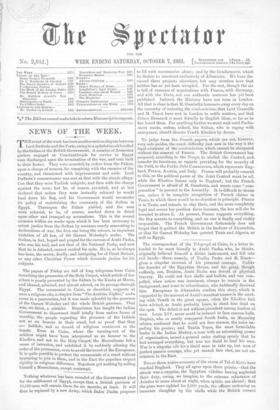The correspondent of the Telegraph at Cairo, in a letter
in- tended to be most friendly to Arabi Pasha, who, he thinks, originally believed himself a divine instrument, and fell into evil hands—those, namely, of Toulba Pasha and M. Nina,— gives a singular account of his personal courage. Unlike the founder of the Egyptian throne, and his great, though ruffianly, son, Ibrahim, Arabi Pasha was devoid of physical, bravery. Ho could not face shells and bullets, and was com- pelled, when action was imminent, always to remain in the background, and trust to subordinates, who habitually deceived. him. Europeans in Alexandria confirm this story, which is supported by the account of Arabi's manifest tremor in the meet- ing with Tewfik in the great square, when the Khedive had. been advised, de Arabi probably knew, to shoot him dead on. the spot. The defect is not without precedent among leaders of men. Louis XIV. never could be induced to face cannon-balls.. Dupleix, who so nearly conquered South India, as Macaulay relates, confessed that he could not face cannon, the noise im- peding his genius ; and Tantia, Topee, the most formidable- leader in the Indian Mutiny, a man with an astonishing power of organisation, issued a general order stating openly that he had arranged everything, but was too timid to lead his men. War is a singular role for a timid man to take up, but men of perfect passive courage, who yet cannot face shot, are not nn,
common in the East.






























